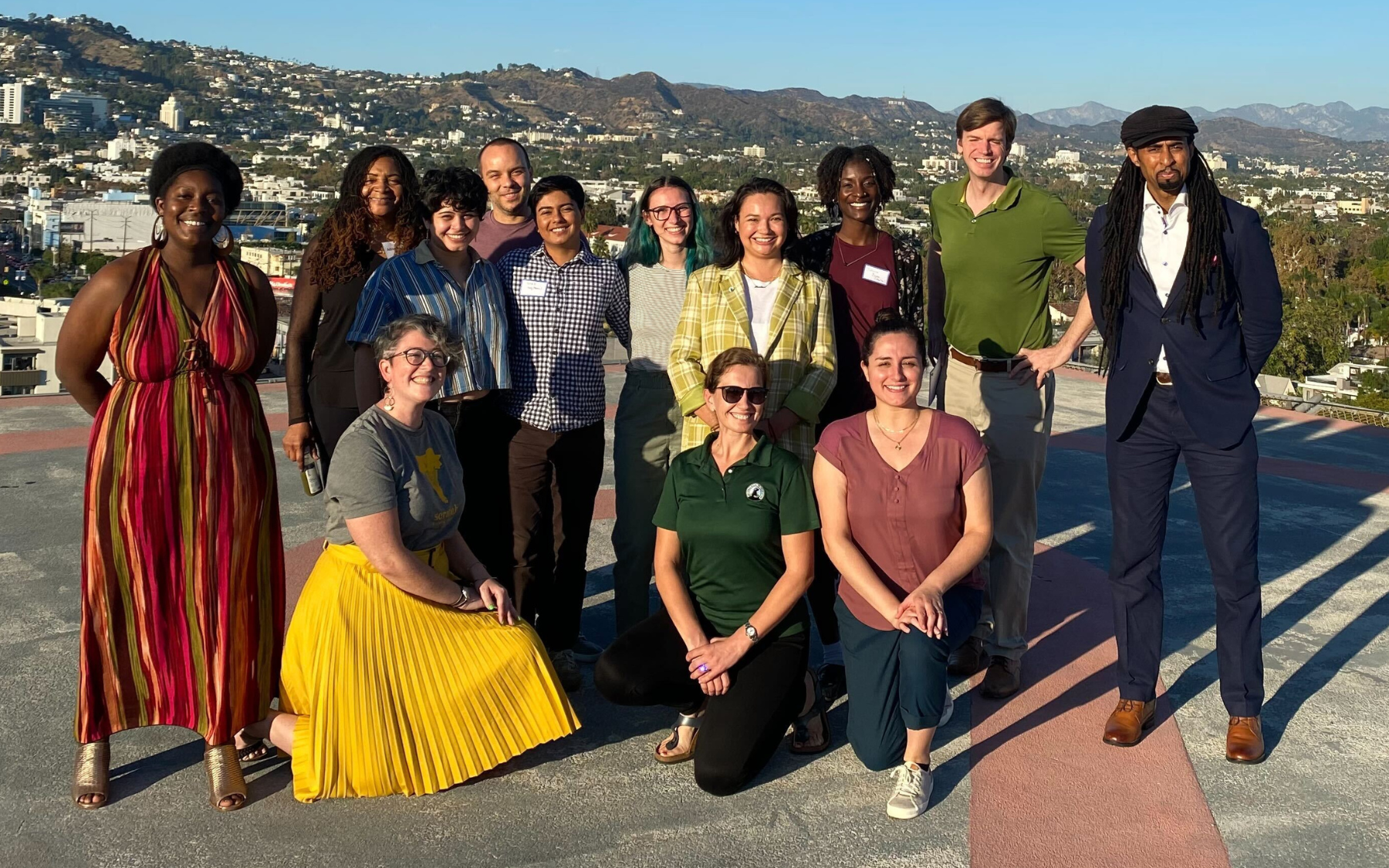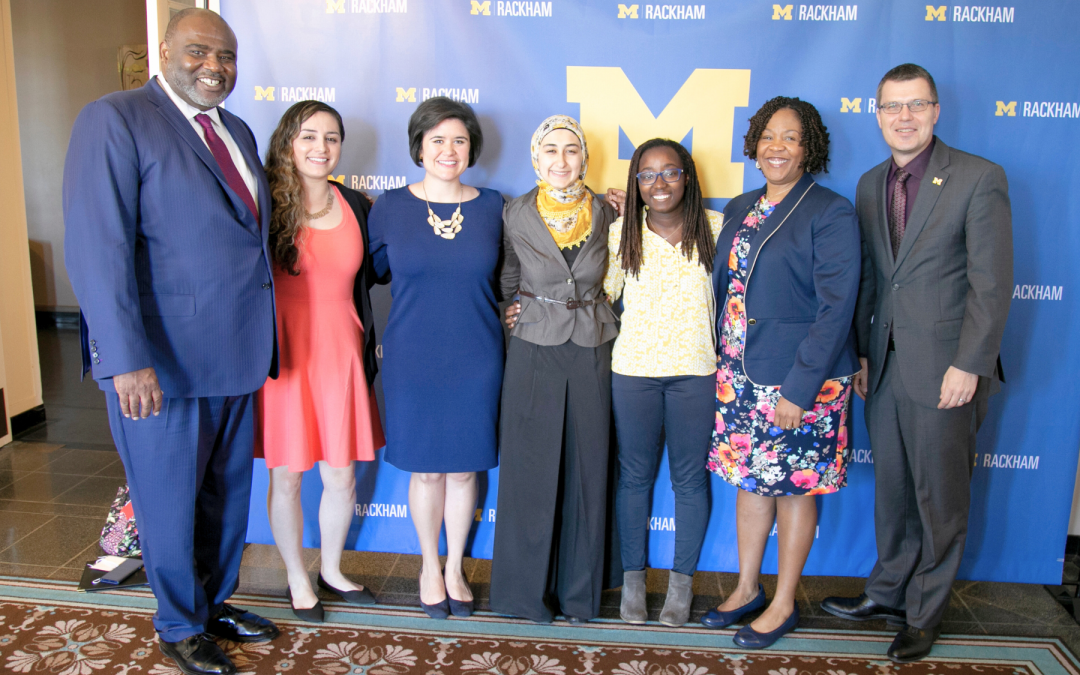The old adage “the end justifies the means” is one way to critically paraphrase the philosophical underpinnings of the early 20th century environmental conservation movement. Historically, conservation leaders have stolen land from Indigenous people, enacted eminent domain land grabs, and perpetrated other unjust actions in service of environmental conservation.
Rackham alum Rebeca Villegas (M.S., M.U.R.P. ’20) is changing that harmful dynamic. As the national director of environmental justice strategy for the National Wildlife Federation, she works to institutionalize environmental justice principles across the federation’s 400 member staff, its board of directors, and its 52 affiliate organizations.
“Early conservationists were predominantly white men who were of higher economic status and positions of power,” says Villegas.
“They were interested in creating spaces for themselves and for their families. Not to downplay the positive environmental impacts that these folks created, but these spaces–national parks, public lands–were never meant with people of color in mind or low income people.”
In order to foster environmental justice, Villegas feels it is imperative to acknowledge and rectify the racist histories and harmful impacts of early conservationists.
She points to Theodore Roosevelt’s signing of a federal law to make Yosemite Valley part of Yosemite National Park in 1906, an action he took without concern for the fact that the valley is the traditional homeland of the Ahwahnechee people. The new law had and continues to have devastating impacts on their mobility throughout their ancestral lands. It banned traditional subsistence practices like hunting, fishing, gathering, and burning forest undergrowth, and it resulted in the forced removal of the Ahwahnechee people from their homes.
Villegas also points to the country’s first major landscaped public park, Central Park, which was conceived of to counter urban pollution and provide green space to Manhattan residents. To create the park, the city displaced Seneca Village, the largest community of free African American property owners in pre–Civil War New York, secured through an eminent domain claim in 1857. Many historians believe the land was undervalued for the claim, resulting in lower than market value pay-outs for Seneca Village residents.
“Environmental justice takes into account history. It takes a hard look at impacts.”
“Environmental justice takes into account history. It takes a hard look at impacts. It works with communities to address issues and ensures that we’re continuously moving forward to protect wildlife and to protect people,” Villegas says.
Learning and Growing
Beginning undergraduate studies at U-M’s Taubman School of Architecture and Urban Planning opened Villegas’s eyes to new career possibilities.
“I didn’t even realize environmental studies was a career until I was in my first year of college,” Villegas says. “But then I took a class, Ecological Studies 101, where I learned about climate change. That’s really where my spark and interest in environmental studies grew.”
After attaining her undergraduate degree, Villegas worked at the National Wildlife Federation, serving as their coordinator of affiliate and state engagement before returning to Ann Arbor in 2017 to earn two master’s degrees: a master of science in environmental justice, policy, and planning and a master’s of urban and regional planning in land use and development.
“I was always interested in how we can modify the physical world to bring beauty and health and just overall vibrancy to a community regardless of their economic or residency status,” Villegas says of her degree path.
Rackham’s DEI Certificate Program
During her graduate studies, Villegas also worked part-time as a graduate student staff assistant with Rackham’s Professional Development and Engagement team to launch the Professional Development Diversity, Equity, and Inclusion Certificate program. She was also a participant in the program, calling it “the biggest highlight” of her time at U-M.
“There were a lot of things that I was feeling in the environmental movement and before the program, and I didn’t know how to name them. ‘Why am I the only person of color in the room? Why do I feel like those in power are completely out of touch with the reality and barriers people like me face on a daily basis?’ The DEI Certificate Program gave me the language I needed to really start to understand and address these things that I was feeling.”
Over the course of the program, Villegas wrote a diversity statement, developed a deeper understanding of unconscious bias, practiced speaking across cultures, learned how to address assumptions, and centered her network around fellow graduate students invested in DEI work.
“You can apply diversity, equity, and inclusion to every single career path.”
“It’s OK to come from a space where you might have not engaged in issues of diversity, equity, and inclusion in the past,” Villegas encourages. “The program is for everybody, and it makes you a better professional. You can apply diversity, equity, and inclusion to every single career path.”
DEI Skills at Work

The 2022 Equity, Justice, and Environmental Justice Team retreat participants, including Villegas (front row, far right), with senior leaders Collin O’Mara, president and chief executive officer (top row, second to last) and Mustafa Santiago Ali, executive vice president (top row, far right) in Los Angeles for the National Wildlife Federation Board of Directors meeting.
Villegas rejoined the National Wildlife Federation after graduating with her master’s degrees in 2020 and finds herself using skills built through the DEI Certificate Program every day. Recently, at an annual meeting with partners and affiliate organization leaders, Villegas applied a vital skill that she learned through the DEI certificate program: the Iceberg Identity exercise, designed to help groups get to know one another’s identities “below the waterline of the iceberg.”
“We want to get folks thinking about their positionality and how they’re coming to the table. Relationship building and making room to really get to know one another is so important to the work of environmental justice. We can’t just jump into the work, which we tend to do in this field. We need to make sure we’re listening and really hearing folks, meeting people where they’re at with what they need,” she says.
“Relationship building and making room to really get to know one another is so important to the work of environmental justice.”
In her current role at the National Wildlife Federation, Villegas works to bring communities together to address the intersectionality between wildlife conservation and social justice, particularly when issues like legacy pollution are at play.
“One example of the intersection between legacy pollution and public health can be seen by looking at COVID impact maps,” Villegas says. “Neighborhoods where people experienced the highest rates of COVID deaths were the very same sites where pollution has been historically high. Folks who experience pervasive air quality issues develop asthma, heart disease, and other issues that make COVID a deadly crisis.”
By listening to marginalized communities and working with them, Villegas and her team at the National Wildlife Federation have had a role in influencing critical legislation such as the American Rescue Plan Act, the Infrastructure Investment and Jobs Act, and the Inflation Reduction Act.
“We can’t expect folks to care for the environment or certain species if they’re personally struggling, if they can’t breathe, if financially they have to work two or three jobs to make a living,” Villegas says.
“Collectively, we are reckoning with our past and taking intentional steps to transform the conservation movement.”
Learn more about the Rackham Professional Development Diversity, Equity, and Inclusion Certificate.
How Rackham Helps
Villegas cites her work helping to launch the DEI Certificate Program as one of the biggest supports during her graduate studies–both financially and professionally.
“Being a graduate student staff assistant really helped me move forward and accomplish my goals.”

